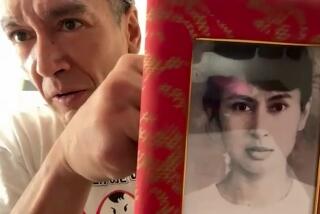Prison Walls Can’t Block China Dissident’s Love for His Family
- Share via
BEIJING — In poignant letters from prison, one of China’s best-known dissidents sent his wife kisses and advised his sickly daughter to get more sun and exercise.
“Did you have a happy birthday?” Xu Wenli wrote his daughter in one of five letters obtained by the Associated Press recently.
In another, he wrote gleefully, “I had a great weekend because I got six letters.”
Xu’s letters, dated since April and sent to his family in Beijing from the city’s No. 1 Prison, are his only contact with the outside since he was barred from receiving visitors in 1985, four years into a 15-year sentence for counterrevolutionary activity.
Xu, 43, has spent much of the time in solitary confinement.
The former electrician was among the leaders of China’s 1978-79 Democracy Wall Movement, during which Deng Xiaoping, newly in power, tolerated unprecedented calls for multiparty democracy and other reforms.
But in early 1979, his position in the ruling Communist Party consolidated, Deng ordered a crackdown on the dozens of unofficial journals that had sprung up, and he put a stop to the so-called Democracy Wall, a brick wall in Beijing where posters with critical messages were hung daily.
Xu mimeographed the underground magazine April Fifth Forum in his home.
In it, he argued that a multiparty system is not anti-Marxist and would help the socialist cause. He was arrested in 1981 and convicted the next year.
His letters, addressed to his wife Qang Tong and 16-year-old daughter, Xu Jingjing, said nothing about his own condition. Instead, he sent a steady stream of questions and advice.
To the daughter, who has been ill for several years with a bad back, he wrote on Oct. 28: “You should improve your daily nutrition, exercise daily and make a study plan. After you make your plans, tell me or I will worry.
“Did you have a happy birthday? No matter how tired, how busy you are, try to squeeze in time to sing, listen to music, play badminton, and then you will be happier and the back pain will be less. . . . When you’re recovered you’ll be jumping around like a rabbit.”
To his wife, a teacher, he wrote, “Your school is too far away. Try not to bicycle if possible. . . .When you go home after school, is there anyone to accompany you?”
He closed, “I’m kissing you, my dear.”
In the most recent letter, dated Dec. 2, Xu wrote, “Regarding your letter of Nov. 12, never mind the contents. The mere fact that it’s already four pages causes tears of happiness to cover my face.”
He also wrote of his pride in his family, adding, “Because of you, and for you, I can be at peace and accept what fate sends.”
Xu also expressed concern for his family in a “self-defense” essay smuggled from prison in 1985.
It was the publication of this essay in Western periodicals that caused authorities to cancel his visitor privileges.
Ren Wanding, a fellow participant in the Democracy Wall Movement who was jailed for four years, said Xu was allowed to send a two-page letter about once every two months.
Ren, who was released in 1983, remained silent until November, when he gave foreign reporters a long essay on the Democracy Wall Movement, also called the Beijing Spring.
In a new essay released recently, Ren declared the 12 months beginning last November “Beijing Spring Memorial Year” and said his goal is to draw international attention to the plight of his imprisoned friends.
More than a dozen leaders of the movement remain jailed.
One of those leaders is Wei Jingsheng, who pleaded for democracy as a “fifth modernization” to go along with the government’s program of improving agriculture, industry, science as well as the military.
Although the Communist Party has encouraged greater openness on selected topics, including disclosure of official government corruption, calls for any change in the party’s ruling role remain forbidden.
Sporadic calls by students for democracy have been suppressed, including a series of massive nationwide demonstrations in the winter of 1986-87.
More to Read
Sign up for Essential California
The most important California stories and recommendations in your inbox every morning.
You may occasionally receive promotional content from the Los Angeles Times.













